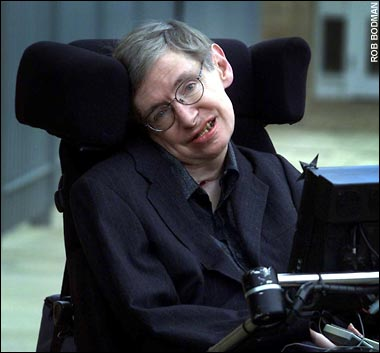Dr. Stephen Hawking, 1942-2018

April 2, 2018
Doctor Stephen Hawking, a world renowned physicist, died in his sleep on March 14th, 2018. Dr. Hawking was not only remembered for his discoveries in the fields of both physics and cosmology but was also recognized for his role as an active science communicator. Although Hawking never received a Nobel Prize, he was one of the most influential people in the modern era of science. In fact, some people had considered him the “Einstein of our generation.”
Stephen William Hawking was born on January 8th, 1942, in Oxford England. His parents, Isobel and Frank Hawking, were both graduates of Oxford University. Hawking’s parents encouraged Stephen to become a doctor when he was a teenager, but Hawking had had strong interests in both math and astronomy ever since he was a boy, and he refused to become a doctor. He attended St. Albans, an independent school in England, and later went to college at Oxford. Even though Hawking was considered intellectual amongst his teachers, professors, and peers, he was never considered the brightest student due to his lack of motivation and laziness. Instead of studying, Hawking would spend most of his time seeing how certain objects worked by taking them apart. He graduated with a first class honors in physics in 1962, and quickly started his PhD at Cambridge University.
During Hawking’s time at Cambridge, he was diagnosed with Lou Gehrig’s disease, a neural disease that weakens the nerves. Hawking was informed that he had only a few years to live, which ultimately discouraged him from continuing his work. Despite this, Hawking was motivated by his girlfriend, later to be his wife, Jane Wilde, as well as his doctors, to continue to research more and finish his PhD. After Hawking lost his ability to speak, a fellow scientist at Cambridge built a synthetic speech device that allowed Hawking to talk with the help of a touchpad. Hawking later obtained his PhD on his research paper titled “Singularities and the Geometry of Space-Time.” The paper proposes that the universe once existed as a space-time singularity, where the entire mass of the universe was fit in an infinitely dense point in space. He was awarded the Adam’s Prize for this paper.
After grad school, Hawking continued his research on black hole mechanics as a postdoc at Cambridge University. He introduced the laws of a black hole, and even argued that a black hole emitted some form of light. One of the most popular theories he proposed was a theory for black hole radiation. In this law, quantum mechanics tells us that two subatomic particles, one negative and the other positive, will be stripped apart near the horizon of a black hole. The negative particle will be sucked into the vacuum, and since a black hole still has mass, the black hole will slowly decay over a long period of time. This theory would later be named “Hawking Radiation” in his honor.
Hawking had two spouses in his lifetime. He met Jane Wilde when he was in grad school and later married her in 1965 and had three children: Lucy, Robert, and Timothy. After Stephen contracted pneumonia, the Hawkings’ house was mostly run by aides, which ultimately separated Stephen from both his wife and kids. They later divorced in 1995, but Stephen married his nurse Elaine Mason. Elaine and Stephen divorced in 2007.
Later in his life, Hawking still worked on quantum mechanics, black holes, and general relativity, but also spent a majority of his time as a science popularizer. Besides his intellect, Hawking was able to explain extremely difficult topics in ways in which lay people could understand them. He had several cameos in different shows, such as Star Trek and The Simpsons. Hawking published one of the most popular science books, A Brief History of Time, which was translated into 40 languages and sold over 25 million copies. The film The Theory of Everything released in 2014, portrayed the life of Stephen Hawking. The notable awards he received are the Copley Medal from the Royal Society at the age of 32 in 2006. He also was the 17th person to earn the Lucasian Chair, 310 years after Sir Isaac Newton. Hawking was even offered knighthood from the queen, but he refused the offer.
Hawking was one of the most influential people in the history of science, and he inspired many scientists in the past decades. “I was saddened when I heard of the passing of Stephen Hawking. He was one of the most brilliant physicists of our time,” said Mrs. Coyle, a physics teacher at the school. “His work on the entropy black holes and Hawking Radiation was his most memorable accomplishments. He came up with the idea that black holes give off radiation at their event horizon and under certain conditions, could grow smaller and disappear due to the uncertainty principle. I read his book A Brief History of Time, when it was first published. His quest for the explanations of the universe was very inspiring as was the way he persevered despite his adverse medical condition from such a young age. He continued to pursue his dreams.”
Hawking’s work on cosmology has inspired millions of people across the globe. With the loss of an amazing person, the magic of Stephen Hawking’s work will live on. Stephen Hawking has not only taught us more about space, but he has taught us an equally important lesson of persevering even in the most difficult circumstances. Like Stephen Hawking once said, “However bad life may seem, there is always something you can do, and succeed at. While there’s life, there is hope.”

















































































































































